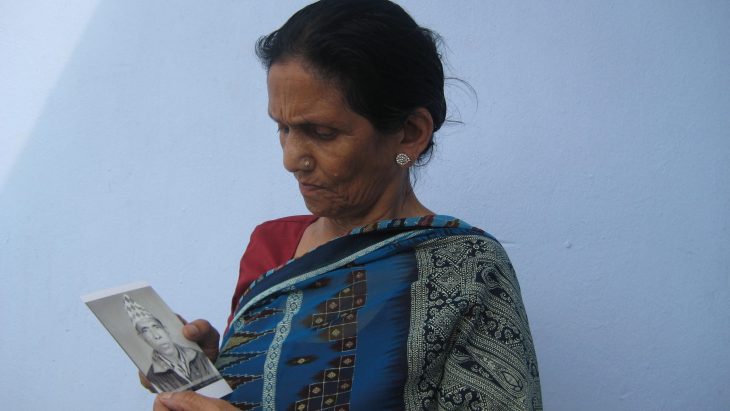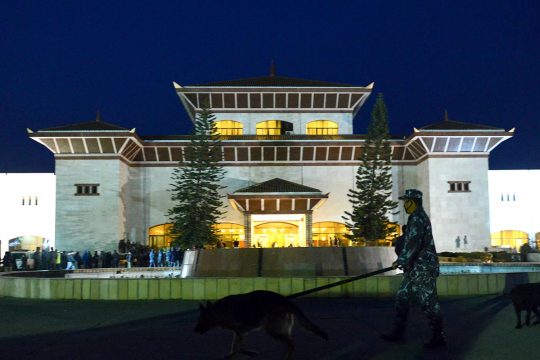More than three and half months after the formation of the Commissions for Truth and Reconciliation and the Investigation of Enforced Disappearance, little concrete action has been taken to move the country forward towards sustainable solution. Now, amidst the ongoing earthquake crisis, the crucial Supreme Court verdict of February 26th, 2015 has been called into question. Oppose this ruling – the government is creating political motives and taking advantage of the earthquake to marginalize conflict victims who are already the victims of earthquake putting aside from social justice. Finally the government submitted its application to review the SC verdict, first the court rejected and later through the attorney general, in the middle of earthquake crisis, submitted again and SC accepted the application to review the SC verdict on 24th May. The earthquake is being used as a political tool to gain leverage in the ongoing transitional justice debate - questioning this important ruling when the country is preoccupied with rebuilding. To resolve the future conflict and to make commissions success, government must stress to address conflict victims demand as the main factor here to better link and tie current events with the ongoing Transitional Justice problems.
Despite the selection of commissioners there remain significant gaps in terms of methodology and approach of the Commissions and indeed from the authorities themselves. No clear plan has been established for how either commission will operate. The commission process itself has been stalled by questions of political legitimacy, especially by the Maoists (of all factions) who oppose the February 26th, 2015 Supreme Court verdict that stated amnesties cannot be granted for serious human rights violations, reconciliation cannot be enforced but instead needs the full consent of the victims, government cannot choose which cases to prosecute, the commissions need to send their recommendations directly to the office of the Attorney General, and the conflict related cases currently in the regular criminal justice can be handed over the commissions. Such opposition, along with a high level political compromise to review the court verdict may ultimately polarize the actors in the commission process resulting in continued stagnation. Meanwhile the victims’ community has been working to raise the voices of those affected by conflict-era violations to address their demands for truth seeking, reparation and justice. To meet these demands, the commission must be powerful, independent and reach every family and individual victim across all 73 districts of Nepal to effectively engage them in the transitional discourse.
To date, the transitional justice debate in Nepal has been between the human rights community focused largely on prosecution, and a political class seeking to avoid their own accountability at any cost. Victims’ agendas have been largely absent from that discussion, with victims afforded no agency in any of the transitional processes. While the criminal justice system has failed to tackle impunity, no other process has emerged to recover the truth and provide restorative justice. To address this gap, the commissions’ mandates should explicitly include the independent investigation of conflict related cases and the development of a comprehensive reparations program, to establish the facts of past violations and create mechanisms of support moving forward.
The Transitional Justice Gap
Despite there being no disappearance law in Nepal, families of the disappeared wish to bridge the transitional justice gap by engaging constructively with the disappearance commission. Strong political commitment is needed for any future success of the TRC and Disappearance Commissions; otherwise, both bodies are likely to be lost in transitional politics. The commissioners themselves are confused and ill-equipped for their role, able to get nowhere in such a politicised environment. Recently in Bardiya an effort of conflict victims to file a First Incident Report (FIR) with the police was rejected; the police said conflict era cases should be investigated by the TRC, which contradicts the recent Supreme Court directives. The existing gap amongst the law makers/political parties, security institutions Nepal Army and Police, Ministries and line agencies must clarify their roles in dealing with issues of the past. The confrontations between CPA, interim constitution and the court verdicts must be reconciled; if they’re not such confrontation may generate a new conflict rather than resolving the remains of conflict. Unfortunately, instead of clarifying their roles, which would improve confidence among victims, commissioners have spent the past four months complaining to the media about their lack of office, staff and necessary resources and procedures. Within such complexity and the gaps amongst the actors, conflict victims seek to engage critically with the both commissions if these mechanisms get ready to clarify their way forward.
Pre-requisites for critical engagement
At this stage of the transition, both commissions must develop their working modalities and policies of engagement with victims and their network, to begin building trust and confidence. Victims’ networks seek a level of assurance from both commissions that they will respect the nationally and internationally established principles of transitional justice. There are many questions that remain unanswered including:
- How will the commissions ensure a victim centred approach in their operational work, including the plan of action, roadmap, and strategies?
- Will the commissions engage with various institutions, specifically with the NHRC, security forces, political parties and other agencies?
- Will expectations (time-line, resources, content) of their engagement be shared with conflict victims, including with victims who are living in rural areas far from Kathmandu?
- How will the Commissions’ set their priorities around the range of issues related to truth, reparation and criminal justice?
- What are the modalities through which the commissions will develop their regulations and rules, guidelines, and operating procedures? And will they be developed in broader consultation with victims and ensuring their meaningful participation at all stages?
- Will there be universal access to the rules and procedures of the commissions (structure, victim and witness protection, outreach policy, protection of data and evidence) once developed?
- How will the Commissions ensure an institutional and physical environment that will allow all victims – including children, persons with disabilities, women, and victims of sexual violence – to express themselves securely and appropriately before the commissions?
Civil society and the international community should develop their strategies of engagement with the commissions only after ensuring that the commissions are committed to addressing these issues in detail, since a credible transitional justice process cannot start without the minimum compliance with these pre-requisites.
Victims are the engine of any transitional justice process, in the sense that they are the crucial constituency in terms of both being key sources of testimony and as primary beneficiaries of any process. The needs of the nation and the state cannot be addressed without dealing with the needs of victims.
Beginning in 1996, Nepal’s ‘People’s War’ lasted for 10 years before a peace agreement was finally signed in 2006. This clash of State and Maoist forces caused extensive damage to the country and inflicted deep psychological trauma in victims and their families. Nepal has already paid heavily for the loss of over 16,000 lives, and the uncertainty over more than 1400 disappeared. At the height of the conflict from 2001 to 2004, more than 1400 persons fell victim to enforced disappearances by both State and Maoist forces. Despite the peace agreement and constant pledges by both sides to provide information regarding their loved ones, families continue to wait.
Bhandari is the Founder of National Network of Families of the Disappeared and Missing Persons, and General Secretary of the Conflict Victims Common Platform, can be reached at this adress






